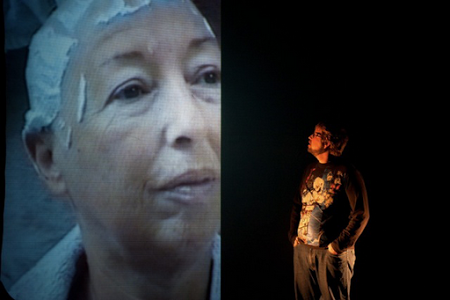The starting point: Canadian-based filmmaker Itai Erdal receives a phone call, telling him his mother has been diagnosed with lung cancer and has nine months to live. He travels to Israel to spend as much time as he can with her in her last months. He documents that time together, shooting hours and hours of footage. He intends to make this into a film, and makes a trailer to raise funds. It doesn’t happen. Time passes – and somehow, somewhere along the way he loses all the film footage. All he has is the trailer and a few photos and outtakes. He is now an award-winning lighting designer. He decides to make a solo show, weaving together his experience in theatre as a lighting designer, and his experience as a witness to the last months of his mother’s life.
It might sound like an odd juxtaposition, but my God it works!
I love the way the family memoir material is used – moving, but with no hint of saccharine sentimentality. His mother is a gorgeous character – absent in that she is dead; so very present in her onscreen appearances and in the memories evoked by her son. I love that she is resolutely chain-smoking through most of the filming. I love her shoulder-shrugging dismissal of any fear of death. I love her straightforward unflinching discussion of facing and dealing with pain, with invasive treatments, with hair loss. It is all so – ordinary, sadly, in that so many people face cancer. Yet simultaneously so extraordinary, a unique individual experience documented and reflected upon.
The mix of documentary film, verbatim reporting on family members’ responses, commentary on his relationship with his mother, sister and childhood best friend Amir all works brilliantly. He’s not an actor but he’s a great storyteller, and I’d rather that any day of the week (having seen enough ‘acting’ to last me a lifetime). As is inevitable in the case of family memoir, the show acts also as an autobiography. We are given a clear picture of the life-choices of Itai Erdal, always framed in the context of his relationship with his mother and his mother-country, Israel. The storytelling mode is enhanced by tiny moments of audience interaction, to remind us that this is real and live and now – a shared space.
Using his knowledge of lighting states, he creates a parallel story – seemingly taking us away from the ‘subjective’ story of illness and death into the ‘objective’ world of technical decisions. But the reflection on how we achieve or enhance emotion onstage through the use of lighting states adds a clever layering to the core story. This subjective/objective merging is then demonstrated beautifully as he lights himself throughout, creating different moods and showing us how the lighting heightens the dramaturgy and manipulates emotional response. Naturally, the lighting design is excellent – and I learnt things along the way. For example, that ‘surprise pink’ isn’t pink, it’s lavender – SURPRISE! And the scenography of the play is seemingly simple but actually complex and beautifully realised: an empty stage; Erdal and his hand-held lighting controller (there are, we are told, 78 lighting cues in this show) moving in and out of a square of light on the floor, grooving in a dazzle of disco lights, or basking in the wash of a ‘shinbuster’ to the side of the stage; the film footage emerging from behind a pair of pulled curtains.
As the mother of three sons, I’ll admit to being s sucker for mother-son stories, and I’ve seen a good few, on stage and on screen (Almodovar et al). But this is a truly original piece – I’ve never seen anything quite like it. It is an Edinburgh Fringe show that will remain with me long after the festival hoo-ha has died down.
Mery Erdal, you live on in your son – it was a pleasure meeting you. Fades to black, but very very slowly…
How to Disappear Completely was shortlisted for a Total Theatre Award 2014 in the Innovation & Experimentation category.

